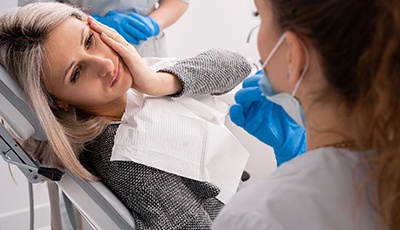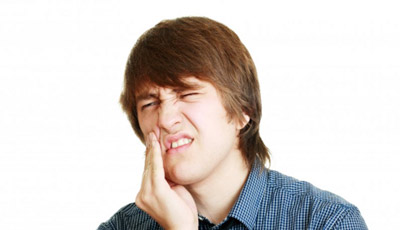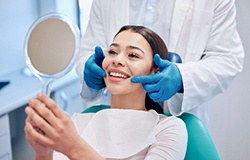
Emergency Dentist – Bartlesville, OK
Quality Emergency Dentistry in Your Time of Need

When we talk about dental emergencies, we’re generally referring to two common scenarios. The first involves teeth damaged by long-term decay and disease, while the other refers to forced trauma. Both can wreak havoc on your smile and your oral health, but knowing the right steps and visiting Dr. Lumpkin at Dentistry by Design can help you prevent permanent damage from being done. His advice is to stay calm, call our office to schedule an emergency appointment, and learn the steps below to handle your issue before your visit.
Why Choose Dentistry by Design for Emergency Dentistry?
- Same-Day Emergency Appointments
- Dentists Who Give Back to the Community
- Honest Care, No Over-Treatment
How We Treat Dental Emergencies

- Call Us. The first step you should always make when faced with a dental emergency is to call our office. We’ll provide you with over the phone first aid guidance and let you know whether a same-day appointment is necessary. We’ll then schedule your visit for as soon as possible.
- Come In. When you arrive, you’ll be greeted by our friendly front desk staff and immediately taken back to one of our operatories. There, we’ll capture any necessary diagnostic images, like X-rays, and you’ll receive a thorough examination from our emergency dentist in Bartlesville.
- Get Treated. Once our team has diagnosed the issue at-hand, we’ll outline a treatment plan to ease your discomfort and restore your oral health. During this time, we’ll be happy to answer any questions you may have so you feel comfortable and confident moving forward with treatment.
The Most Common Dental Emergencies
Sometimes, it can be difficult to determine whether or not you need emergency dental attention. However, if you’re in pain or experiencing any out of the ordinary symptoms, we always recommend giving us a call so we can help you make the next best step for your smile. Below, we’ve also included a list of some of the most common situations that we see.
Understanding the Cost of Dental Emergencies

The costs for emergency care can vary dramatically depending on what services you need. While we can’t give you a cost over the phone, you can get a more accurate estimate when you visit our office for your emergency appointment. Treatment could be as simple as getting a prescription or cavity filling, or as complex as having a root canal or extraction. Either way, the last thing you should do is put off treatment and allow your issue to worsen.
Keys to Preventing Dental Emergencies

Make no mistake, our Bartlesville dental team loves being here for all of your dental needs – from routine checkups to last-minute emergency dentistry. With that said, we completely understand wanting to avoid the latter. That’s why we’ve dedicated this next section to covering our recommendations for preventing serious dental injuries!
Visit Your Dentist Regularly

Simply put, your six-month dental checkups and cleanings are beyond crucial when it comes to maintaining a strong and healthy smile. There are a few reasons for this. To begin, the X-rays and visual exam allow our Bartlesville dentist to catch early signs of damage or disease as well as oral cancer. As for the cleaning portion, the special tools we use can remove calcified plaque known as tartar. These periodic appointments also give patients a great opportunity to ask questions about their oral health, including how to improve their oral hygiene regimen at home and which products are best for their specific dental needs.
Maintain Good Oral Hygiene at Home

One of the most effective ways to prevent dental emergencies is to practice routine preventive care. That includes brushing twice a day, flossing daily, and rinsing with mouthwash each evening to help you remove plaque in-between visits. Remember, using the right products matters! You should have a soft-bristled toothbrush, fluoridated toothpaste, and antimicrobial mouthwash. It’s also important to have floss that you actually use. For example, if you don’t like traditional string floss, you can try adding a water flosser to your regimen.
Stick to a Nutritious Diet

Have you been told that soda, candy, and other sweet treats cause cavities? That’s just one way that what you eat impacts your oral health! As a result, we encourage our patients to be mindful about their meals. While everything is fine in moderation, we recommend filling up on smile-friendly foods when you can, like vitamin-rich fruits and vegetables as well as calcium-rich products. When you do indulge in something that’s high in added sugar, try rinsing thoroughly with clean water and brushing your teeth about 20 minutes later.
Wear a Protective Mouthguard

f you play a contact sport, you should always wear a mouthguard. In fact, surfers, skateboarders, and other athletes that participate in solo sports are even being encouraged to wear one now! After all, all it takes is one bad fall for your day on the water or at the park to turn into an afternoon in your emergency dentist’s chair. If you suffer from chronic teeth grinding, then we also recommend wearing a nightguard while you sleep.
Use Tools to Open Packages, Not Your Teeth

Many patients think that since their teeth are strong and sharp, they can be used as tools to open everything from plastic bags to bottle caps. That’s not the case. On a similar note, you also shouldn’t use your teeth to clip your nails or hold your keys! This can result in numerous dental injuries, including chipped and fractured teeth.
Emergency Dentistry FAQs
Does a toothache always require emergency dental care?
Sometimes a toothache might just be the result of food particles trapped between your teeth. If this is the case, you may be able to resolve the problem yourself using dental floss (though this might not always be the case). However, most causes of toothache will require attention from a dentist. If pain in the tooth lasts longer than a couple of days or is accompanied by inflammation, facial swelling, red or bleeding gums, fever, earache or a dry mouth, then you need an emergency appointment as soon as possible.
Should I go to an emergency dentist or the ER?
If you’re suffering from a life-threatening emergency such as severe oral lacerations or a dental abscess (infected pocket of pus) that’s making it difficult to breathe or swallow, you should call the emergency room. Otherwise, for most dental emergencies you’ll want to call us instead. The doctors and surgeons at the emergency room most likely won’t have the tools or training to deal with issues like broken teeth.
What should I include in my dental emergency kit?
Here are some good items to have on hand in case you suffer a dental emergency:
- Saline solution and a container that can help preserve a knocked-out tooth if you can’t put it back in its socket.
- Dental wax to cover the edges of a broken tooth so that it doesn’t irritate the inside of your mouth.
- Gauze to stop any oral bleeding.
- Over-the-counter painkillers.
- Ice packs to keep down any swelling
Bear in mind that no matter what your kit is stocked with, it can’t take the place of professional dental care; that’s why in addition to your emergency supplies, you’ll want to keep a card with our practice’s address and phone number!
Is a lost baby tooth an emergency?
If your child loses one of their baby teeth due to physical injury, it may or may not be a problem. While reimplantation probably won’t be needed, we’ll need to check and see whether the incident will affect the development of the permanent teeth. Sometimes a spacer will be used to make sure there’s still enough room in the mouth when the adult tooth is ready to come in.
What happens if I don’t replace a missing tooth?
Whether it’s due to physical injury or the ultimate result of an infection, a lost tooth can have serious consequences for your oral health. The remaining teeth will shift into the open space, leading to alignment issues that can heighten your risk of decay. You may also have trouble eating or speaking, and your jawbone will begin to deteriorate. That’s why it’s best to do everything you can to save your natural tooth.
More to Explore
Preventive Dentistry Restorative Dentistry Cosmetic Dentistry Dental Technology Dental Implants Periodontal Therapy Invisalign Clear Braces Sleep Apnea Therapy Nitrous Oxide Sedation View Our Services